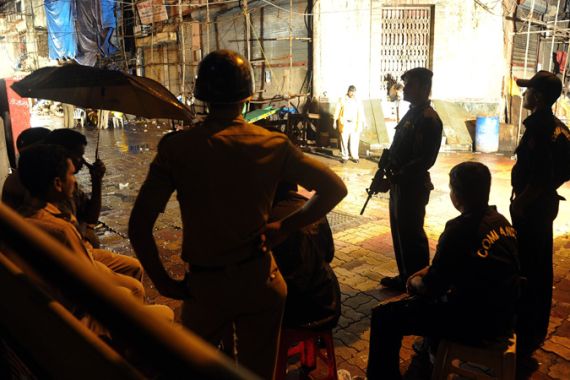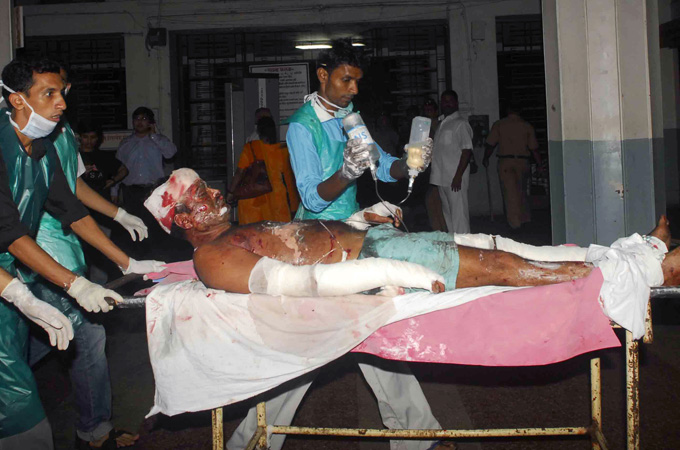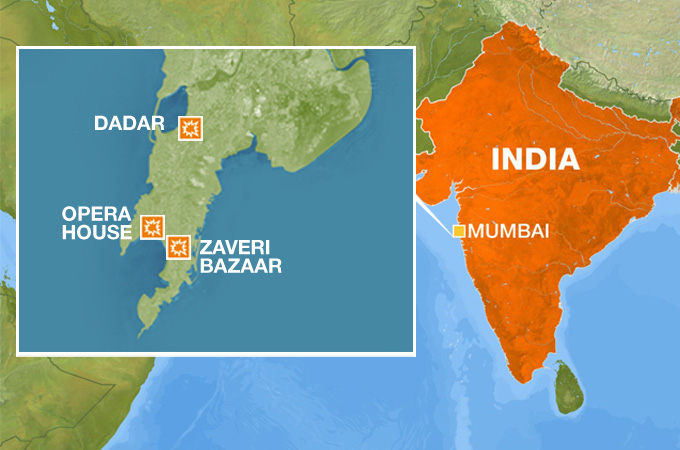India blasts: All ‘hostile groups’ suspected
Police search for clues to perpetrators of deadly attacks as Mumbai reels from rush-hour blasts that killed at least 18.

 |
| The bulk of the injuries from Wednesday’s blasts – possibly caused by Molotov cocktails – are burns [Reuters] |
Indian police are searching for clues into who was behind three co-ordinated bomb blasts that killed at least 17 people in Mumbai in an evening rush hour attack.
Palaniappan Chidambaram, India’s home minister, said on Thursday that all groups “hostile to India” were being treated as possible suspects behind the attacks.
The government’s official press office lowered the death toll from Wednesday’s attacks to 18 from an earlier figure of 21 killed, although the number may change again.
Al Jazeera’s Kamal Kumar, reporting from Mumbai, said that details of the attack were still “sketchy”.
“As of now, there hasn’t been any official line on who could be behind these attacks, but there is speculation that this could be the act of Indian Mujahideen or Lashkar-e Taiba (an armed Pakistani group),” said Kumar.
“But there hasn’t been any official line put out by the government authorities or the security authorities.”
There was no immediate claim of responsibility for the blasts. Indian Mujahideen are described by security analysts Stratfor as “a relatively amateurish group that’s been able to carry out low to medium intensity attacks”.
‘Attacked. Again.’
The bombings were the biggest attack on Mumbai since a 2008 assault on the city by gunmen which killed 166 people. That attack was blamed on the Pakistan-based group Lashkar-e-Taiba, raising tensions with neighbour and nuclear rival Pakistan.
Newspaper headlines voiced a mix of resignation and outrage over the latest attacks on a city of more than 10 million that is home to India’s main stock exchange .
“Attacked. Again,” said the Hindustan Times. “We’re All sitting ducks,” said the Economic Times.
The blasts come as Manmohan Singh, the beleaguered Indian prime minister, struggles to get past a series of corruption scandals and a resurgent opposition that has led to policy paralysis in Asia’s third largest economy.
A cabinet reshuffle this week was criticised as too little, too late.
India’s stock and commodity exchanges opened as normal on Thursday.
Schools were also open close to the sites of the bombings and public transport was operating, although heavy monsoon rains led to delays and cancellations of train services during the morning rush hour.
Blasts targeted crowds
The bombings, centred mainly on south Mumbai’s jewellery market area, were described by Chidambaram as “terror attacks”.
“This is another attack on the heart of India, heart of Mumbai. We will fully meet the challenge, we are much better prepared than 26/11,” Prithviraj Chavan, the state’s chief minister, told NDTV on Wednesday evening, referring to the 2008 attacks.
 |
| The blasts hit Mumbai’s dense business district |
The blasts occurred during rush hour (1315 GMT) on Wednesday within minutes of each other. At least one car and a motorbike were used in the attacks in which improvised explosive devices were believed to have been used, officials said.
The biggest blast was in the Opera House area, a hub for diamond traders, close to where the 2008 attackers carried out their bloody rampage.
Several messages on Twitter immediately called for blood donations and offers of shelter for those stranded as a result of temporary transportation disruptions on Wednesday night.
Another blast, also in south Mumbai, was at the Zaveri Bazaar, India’s largest bullion market which was hit twice in the past. The third blast was at Dadar, in a crowded street housing Muslim and Hindu shops in the centre of the coastal city.
Targeting two markets that trade in diamonds, gold and silver could also suggest the near-simultaneous attacks may have been linked to the Mumbai underworld, some newspapers speculated.
There was no immediate indication any Pakistani group was involved. But any suggestion of attributing blame to Islamabad would complicate a fraught relationship with India – with whom it has a long-running dispute over Kashmir – and further damage the country’s fraught relations with the United States.
However, talks between the foreign ministers of India and Pakistan will take place as planned at the end of July despite the triple blasts in Mumbai, the Indian foreign ministry said on Thursday.
International response
World leaders expressed anger and revulsion at the attacks.
“We condemn these despicable acts of violence designed to provoke fear and division. Those who perpetrated them must know they cannot succeed,” said Hillary Clinton, the US secretary of state, in a statement.
“I will be traveling to India next week as planned. I believe it is more important than ever that we stand with India, deepen our partnership, and reaffirm our commitment to the shared struggle against terrorism.”
Catherine Ashton, the European Union foreign policy chief, also denounced the bombings as “heinous” while Britain and France reaffirmed their support for India in the fight against terrorism.
William Hague, the British foreign secretary, also issued a statement of solidarity with Mumbai.
“I send my deepest condolences to all those who have lost relatives or been injured in the bomb blasts in Mumbai,” read thes statement on the foreign office Web site.
“These were deplorable acts of terrorism. The UK stands firmly with India in the face of such atrocities. We are committed to working with the Indian government and our allies and partners to combat the threat from terrorism in all its forms.”